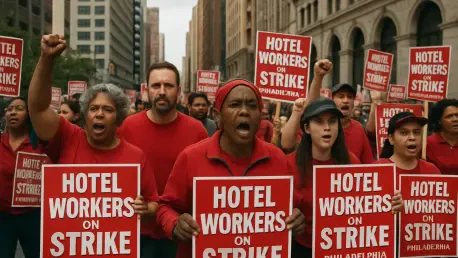In a significant display of labor solidarity, hotel workers in Philadelphia have taken to the streets, walking off their jobs at prominent establishments like the Sheraton Philadelphia Downtown and the Hampton Inn Philadelphia Center City-Convention Center. Represented by Unite Here Local 247, which advocates for thousands of hospitality and food service employees in the region, these workers—including room attendants, cooks, and other essential staff—initiated a strike to demand higher wages, better pension contributions, and improved healthcare coverage. The action follows the expiration of their contracts, revealing deep-seated frustrations with current compensation and working conditions. This movement is not just a local issue but part of a broader wave of unrest in the hospitality industry, as employees push for recognition of their critical roles. The stakes are high, and the outcome of this strike could set a precedent for labor negotiations across the sector, drawing attention to the challenges faced by those who keep hotels running smoothly.
Rising Tensions in the City of Brotherly Love
The labor dispute in Philadelphia has spotlighted long-standing grievances among hotel workers who feel their pay and benefits do not reflect the physical and emotional demands of their jobs. Unite Here Local 247 represents a diverse group of employees who maintain that their current wages are insufficient to meet the rising cost of living in the city. Many of these workers juggle multiple roles, from cleaning rooms to preparing meals, often under tight schedules and with little room for error. The strike, which began recently, has disrupted normal operations at the targeted hotels, drawing public attention to the workers’ plight. Beyond just financial compensation, the union is pressing for enhanced pension plans to secure their future and healthcare benefits that provide adequate coverage for families. This collective action underscores a growing frustration with an industry that relies heavily on their labor while offering limited upward mobility or security, highlighting a disconnect between worker needs and management priorities.
Furthermore, the potential for escalation looms large as several other hotels in Philadelphia, including the Hilton Garden Inn Center City and The Warwick Hotel Rittenhouse Square, are listed as possible strike targets by the union. Contract disputes at these locations remain unresolved, suggesting that the current walkouts could be just the beginning of a broader labor movement in the area. The workers’ demands are consistent across these establishments, focusing on fair pay that aligns with the economic realities of urban life and benefits that protect their well-being. Management at these hotels faces increasing pressure to address these issues before more employees join the picket lines. The situation paints a picture of an industry at a crossroads, where failure to negotiate could lead to widespread disruptions during peak travel seasons. This ongoing tension reflects a critical moment for hospitality workers in the city, as they seek not just immediate gains but also long-term improvements in their working conditions and quality of life.
A National Wave of Hospitality Labor Unrest
The Philadelphia strikes are not an isolated phenomenon but rather part of a national trend of labor unrest within the hospitality sector, as seen in parallel actions in cities like Houston, Texas. At the Hilton Americas-Houston, the largest hotel in the city, workers have been striking for weeks, demanding a minimum wage of at least $23 per hour to match the cost of living and the grueling nature of their work. This mirrors the sentiments expressed by their counterparts in Philadelphia, where the call for livable wages and better benefits resonates deeply. Both groups argue that their essential contributions to the guest experience are undervalued, especially in an industry still rebounding from economic challenges. While major hotel chains like Hilton have publicly committed to negotiating in good faith, progress remains slow, leaving workers in limbo. This shared struggle across state lines points to systemic issues in the hospitality field, where profitability often takes precedence over employee welfare, fueling widespread dissatisfaction.
Adding to the complexity, the lack of direct responses from key players like Marriott, which operates the Sheraton in Philadelphia, complicates the path to resolution. Without clear communication from management, workers and union representatives are left to speculate on the next steps, prolonging uncertainty for all involved. The strikes in both Philadelphia and Houston highlight a growing impatience among employees who feel their voices have been ignored for too long. These actions serve as a powerful reminder of the collective strength of unionized labor and their ability to disrupt operations to demand change. As more cities witness similar walkouts, the pressure mounts on hotel chains to reevaluate their labor practices and address the root causes of discontent. This national pattern suggests that the hospitality industry must confront these challenges head-on to avoid further escalation, potentially reshaping how workers are compensated and supported in the years ahead.
Looking Back at a Pivotal Moment for Change
Reflecting on the events that unfolded, the strikes by hotel workers in Philadelphia marked a critical juncture for labor rights in the hospitality sector. Employees at major hotels stood united under the banner of Unite Here Local 247, pressing for better wages and benefits after their contracts expired without renewal. Their actions echoed similar efforts in Houston, revealing a widespread demand for fairness and recognition across the industry. Although resolutions were not immediately achieved, and responses from management remained limited, the strikes succeeded in bringing national attention to the struggles of these essential workers. Moving forward, hotel chains might consider proactive dialogue with unions to prevent future disruptions, while policymakers could explore regulations that ensure fair compensation. The path ahead involves fostering a balance between profitability and employee satisfaction, ensuring that those who power the hospitality experience are valued for their indispensable contributions.









